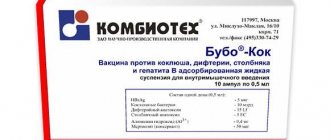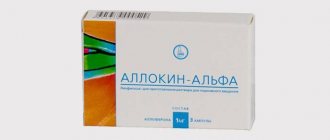Write a review
Reviews: 0
Manufacturers: Sanofi-Aventis
Active ingredients
- Hepatitis A vaccine (inactivated adsorbed)
Disease class
- Acute hepatitis A
Clinical and pharmacological group
- Not indicated. See instructions
Pharmacological action
- Immunostimulating
Pharmacological group
- Antiviral agents
- Vaccines, serums, phages and toxoids
Solution for injection Avaxim 80 (Avaxim 80)
Instructions for medical use of the drug
Description of pharmacological action
An inactivated vaccine for the prevention of viral hepatitis A, containing the hepatitis A virus inactivated by formaldehyde.
Indications for use
Viral hepatitis A (prevention) in adults and children over 2 years of age, especially in persons at risk: unimmunized persons traveling to endemic regions (with a high incidence of hepatitis A), persons at occupational risk of infection (doctors, nursing staff , including caring for adults and children in wheelchairs, sewer and water supply personnel, food industry and catering workers), patients with hemophilia, patients with multiple blood transfusions, drug addicts using intravenous drugs, homosexuals .
Release form
One dose (0.5 ml) in a glass syringe with a capacity of 1 ml, placed in a closed transparent cell packaging; one closed cell package is placed in a cardboard box with instructions for use. — 10 doses (5 ml) of vaccine per vial — 10 vials with instructions for use
Pharmacodynamics
The vaccine is a mixture of inactivated purified virions adsorbed on aluminum hydroxide. Promotes the formation of immunity against the hepatitis A virus, causing the production of specific antibodies. The number of antibodies that appear after using the vaccine is practically no different from the number of antibodies to the hepatitis A virus in people who have had this disease. In most patients, antibodies circulate in the blood for at least 1 year after the initial course of vaccination.
Use during pregnancy
The effect of this drug on the embryo or fetus has not been studied. The decision to vaccinate pregnant or breastfeeding women should be made only on the basis of an assessment of the real risk of contracting hepatitis A. The effect of this vaccine has not been studied during breastfeeding, so its use during this period is not recommended.
Contraindications for use
Acute infectious and non-infectious diseases, exacerbations of chronic diseases, immunodeficiency conditions, malignant blood diseases and neoplasms, hypersensitivity to vaccine components, pregnancy, lactation (breastfeeding).
Side effects
Administration of AVAKSIM 80 can lead to the following side effects of varying severity: - pain and redness at the injection site. Very rarely there is a lump at the injection site. - the most common adverse reactions: moderate increase in body temperature, fatigue, headache, muscle and joint pain, and gastrointestinal disorders (abdominal pain, diarrhea, nausea and vomiting). - in rare cases: a slight reversible increase in the activity of liver enzymes (transaminases).
Directions for use and doses
AVAXIM 80 is injected intramuscularly into the deltoid muscle (shoulder muscle). Do not administer intravenously: make sure that the needle does not enter a blood vessel. The vaccine should not be administered into the gluteal muscles (due to variability in the thickness of the fat layer) or intradermally, since in these cases the induction of a reduced immune response may occur. In special cases - in patients with thrombocytopenia or bleeding, the vaccine can be administered subcutaneously. Vaccination is carried out once in a dose of 0.5 ml. Revaccination is carried out with the same dose after 6-18 months. Based on available data, subsequent booster vaccinations are recommended every 10 years.
Interactions with other drugs
The vaccine can be administered simultaneously with immunoglobulins, provided that different parts of the body are used to inject the vaccine and immunoglobulins. Since this vaccine is inactivated, combination with other inactivated vaccines should not affect the effectiveness of vaccination provided the vaccines are administered to different parts of the body. In particular, the vaccine can be used simultaneously with a recombinant vaccine for the prevention of hepatitis B, typhoid vaccine, and a live vaccine for the prevention of yellow fever. In addition, this vaccine can be used for revaccination in cases where the previous vaccination was carried out with other inactivated vaccines for the prevention of hepatitis A. The doctor should be informed about any treatment that coincides with vaccination or precedes vaccination. The vaccine cannot be mixed with other vaccines in the same syringe.
Special instructions for use
Vaccination with this drug does not prevent viral hepatitis of other etiologies, as well as infections caused by other known hepatotropic microorganisms. Immunosuppressive therapy or an immunodeficiency condition may cause a poor immune response to the vaccine. Vaccination given during the incubation period of hepatitis A disease may not be effective.
Storage conditions
In a place protected from light, at a temperature of 2–8 °C (do not freeze).
Best before date
24 months
ATX classification:
J Antimicrobials for systemic use
J07 Vaccines
J07B Vaccines for the prevention of viral infections
J07BC Hepatitis vaccine
J07BC02 Hepatitis A, purified antigen
pharmachologic effect
The vaccine is a mixture of inactivated purified virions adsorbed on aluminum hydroxide. Promotes the formation of immunity against the hepatitis A virus, causing the production of specific antibodies. The number of antibodies that appear after using the vaccine is practically no different from the number of antibodies to the hepatitis A virus in people who have had this disease. In most patients, antibodies circulate in the blood for at least 1 year after the initial course of vaccination.
Similar drugs:
- Groprinosin Oral tablets
- Tea tree DN Ointment for external use
- Imigen Oral tablets
- Decaris Oral tablets
- Galium-Heel Oral drops
- Rosehip fruits (Rosae fructus) Vegetable raw materials
- Allergy Tablets
- IRS 19 (IRS 19) Nasal spray
- Vagisan (VAGISAN) Capsule
- Isla-moos Pastilles
** The Drug Directory is intended for informational purposes only. For more complete information, please refer to the manufacturer's instructions. Do not self-medicate; Before you start using Avaxim 80, you should consult a doctor. EUROLAB is not responsible for the consequences caused by the use of information posted on the portal. Any information on the site does not replace medical advice and cannot serve as a guarantee of the positive effect of the drug.
Are you interested in Avaxim 80? Do you want to know more detailed information or do you need a doctor's examination? Or do you need an inspection? You can make an appointment with a doctor - the Euro lab is always at your service! The best doctors will examine you, advise you, provide the necessary assistance and make a diagnosis. You can also call a doctor at home . Euro lab clinic is open for you around the clock.
** Attention! The information presented in this medication guide is intended for medical professionals and should not be used as a basis for self-medication. The description of the drug Avaxim 80 is provided for informational purposes and is not intended for prescribing treatment without the participation of a doctor. Patients need to consult a specialist!
If you are interested in any other drugs and medications, their descriptions and instructions for use, information about the composition and form of release, indications for use and side effects, methods of use, prices and reviews of drugs, or you have any other questions and suggestions - write to us, we will definitely try to help you.
Directions for use and dosage
The drug is administered intramuscularly, into the deltoid muscle of the shoulder, for children under 2 years old - into the upper outer region of the thigh. The suspension should not be administered into the gluteal region or intradermally (possibly weakening the immune response). Introduction into the vascular bed is strictly prohibited (you should make sure that the needle does not enter a blood vessel).
Before vaccination, the syringe with Avaxim 80 should be shaken well until a homogeneous suspension is obtained.
Single dose – 0.5 ml.
Mixing Avaxim 80 in one syringe with other vaccines is prohibited!
In order to ensure long-term immunity, revaccination should be carried out with the same dose after 6 months or up to 3 years after the first dose.
In immunocompetent individuals, there is no need for revaccination after double vaccination.
The vaccine should not be used if its color changes or if foreign particles are present. Remains of unused vaccine are disposed of.
Drug interactions
Avaxim 80 can be administered simultaneously into different parts of the body with vaccines that are included in the National Preventive Vaccination Calendar and contain the following components (one or more): toxoids - diphtheria, tetanus; vaccines - against viral hepatitis B, pertussis (whole cell or acellular), against measles, Haemophilus influenzae type b, polio (inactivated or live), against endemic mumps and rubella.
Since the vaccine is inactivated, its combined use with other inactivated vaccines, as a rule, provided that the vaccines are administered to different parts of the body, does not affect the effectiveness of vaccination.
The drug can be administered simultaneously with immunoglobulin against hepatitis A (in different parts of the body). This has no effect on the rate of seroconversion, but may result in the production of lower antibody titers.
Avaxim 80 can be used as a booster dose in cases where another inactivated hepatitis A vaccine was used for primary vaccination.
Side effects
All disorders identified as a result of clinical studies were mild, short-term in nature and resolved independently without additional treatment.
Possible adverse reactions (> 10% - very common; > 1% and < 10% - often; > 0.1% and < 1% - uncommon; > 0.01% and < 0.1% - rare; < 0. 01% – very rare; with unknown frequency – if it is impossible to estimate the frequency of development of disorders from the available data):
- Nervous system: often – headache;
- Musculoskeletal and connective tissue: often – arthralgia, myalgia;
- Gastrointestinal tract: often – diarrhea, abdominal pain, nausea, vomiting;
- Skin and subcutaneous tissue: uncommon – rash, urticaria;
- Mental: often – irritability, insomnia;
- Metabolism and nutrition: often – loss of appetite;
- Disturbances at the injection site and general disorders: often - mild soreness, redness, hardness and swelling at the injection site, weakness, moderate increase in body temperature.
Violations were recorded less frequently after revaccination than after primary vaccination. In patients seropositive for hepatitis A virus, vaccination was tolerated as well as in seronegative individuals.
The reactions observed in children with hemophilia are similar to those in adults.
As a result of post-marketing observations, it was also found that the use of Avaxim 80 may result in the development of vasovagal syncope (with an unknown frequency).
If any side effects develop (both described and not described in the instructions), you should consult your doctor.
special instructions
Immunization is particularly recommended for the following groups of people:
- People living in regions unfavorable for the incidence of hepatitis A;
- Traveling to disadvantaged regions (countries) where outbreaks of hepatitis A are registered;
- Those in contact with patients in hepatitis A outbreaks.
Vaccination can also be given to children who do not have an increased risk of infection, in cases where their legal representatives (guardians) want to protect them from hepatitis A disease.
Avaxim 80 does not provide protection against hepatitis caused by other pathogens (hepatitis B, C, E), as well as other known pathogens that affect the liver.
Hepatitis A seropositivity is not a contraindication to vaccination.
Immunization may not be effective in infected patients vaccinated during the incubation period of hepatitis A.
The doctor must be warned about the recent or concurrent use of any other medicine, including over-the-counter medicine.




